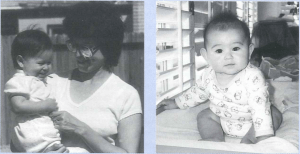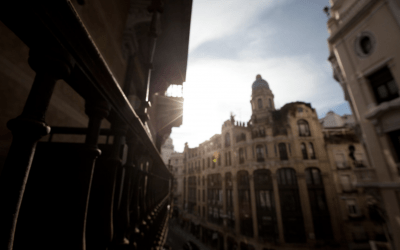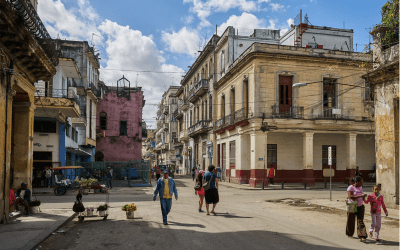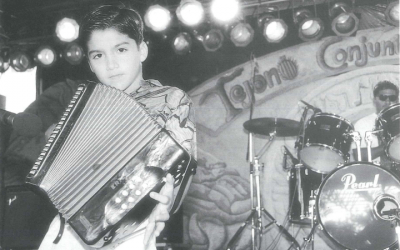Elena and Ela
Two Generations of (Bilingual) Sisters

A young Elena (1982) on the left, her sister Ela (1999) on the right.
Over the summer I had a mission. I was going to speak Spanish with Ela, my then five month-old sister. I’m 19 and speak choppy Spanish, the language of my grandparents, with a horrible accent. I was brought up speaking English. Perhaps my parents were afraid that Spanish might limit my options or cloud my assimilation (though I never officially assimilated from one culture to another). Selfishly, this summer, I could practice my accent and Ela’s sweet smile would continue shining back at me, regardless of my funny accent.
It was also an opportunity for me to bring the language back into the house. Spanish has never been dead in our house. It never ceases to float in and out of our daily lives. But over the summer, Spanish began to linger around for longer periods of time, transferring from just Spanish “baby talk” to everyday conversation. I wonder what role language will play in Ela’s life. Perhaps, and ironically so, bringing Ela up in a predominantly white neighborhood, will actually encourage us to speak to her in Spanish more. She will also be growing up in a time when our society celebrates bilingualism and culture, rather than vanilla assimilation.
My first childhood experience was in Culver City in Los Angeles. We formed an eclectic community and were involved with each other’s lives on a daily basis. Later, after a move to San Diego, we made the transition to a white upper class neighborhood. And both types of neighborhoods seemed comfortable to me. I could survive in both worlds.
Ela, on the other hand, has been born into an elitist Southern California lifestyle. Language included, Ela is bound to grow up very differently than my brother, Esteban, and I have. Over the summer, Ela “helped” me write e-mail, and now that I’m back at school, she actually “writes” (or pounds incessantly) e-mail to me. Ela even has a Turkish nanny, an amazingly well traveled European woman who speaks five different languages. Ela actually responds the fastest to “musey” (French for “mouse”). Ela will grow up with manicured lawns, shiny sport utility vehicles, bottled water, veggi-burgers, smoothies, preschools for the “gifted,” and Baby Mozart music.
I think my parents are counting on my brother and I to serve as their generational link to Ela. I know that I’m looking forward to having Ela be my link to her generation. Speaking for myself, while taking care of Ela, never have I been so exhausted, nor have I felt so energized, alive, aware, and awake. She has already positively changed the environment that she has been born into, though her hometown of Solana Beach, California, will ultimately shape her.
Ela will never experience my Nana’s tiny house in Caléxico the way I once experienced it. I remember my Nana’s house filled and bustling with my Tios and Tias during the holidays, and my brother and I running around in the dirt, playing hide and go seek in her rose garden, filling up the plastic pool on a scorching summer afternoon, walking down the street to the local panaderia to buy fresh pan dulce, watching old telenovelas and falling asleep on the living room floor to the musical sound of the adults quietly speaking in the kitchen with their soft soothing Spanish sounds.
Times have changed. Caléxico is booming: Wal-Mart has arrived. My Nana is on the run; even though up until very recently she used to work out in the fields in northern California every summer, she now is an entrepreneur in her own right. We never spend Christmas, Easter, or Thanksgiving together as an extended family though we don’t live that far apart.
Times have changed. Yet, now when we do get together as a family, it’s because we want to. Today, Ela will be able to learn from our Nana in a way that I am just barely able to. Ela might be more expressive in so many more ways than I was, because she will be more comfortable with her surroundings. And if my parents are still as endearingly “nerdy” as when I was growing up, Ela might be my bilingual (or even trilingual) sister who can partake in fun luxuries, see the value of education, and be an energetic, dynamic force in our community.
Elena C. Chavez ’02 creates DRCLAS DATES for the David Rockefeller Center for Latin American Studies, under the direction of June Carolyn Erlick. She is a Social Studies concentrator and is interested in a myriad of subjects ranging from human rights, Latin@ identities, Latin American politics, and her sister Ela’s sweet smile.
Related Articles
Forum on U.S. Hispanics in Madrid
The Trans-Atlantic Project, an academic initiative to study the cultural interactions between Europe, the U.S. and Latin America has been invited by Casa de América, Madrid, to present a …
Cuba Study Tour
Waiting at José Marti International Airport for the first Harvard students to arrive for January’s DRCLAS Cuba Study Tour, my companion, a theater critic at Casa de las Américas, commented to me …
The Soulfulness of Black and Brown Folk
And so, by faithful chance, the negro folksong – the rhythmic cry of the slave – stands to-day not simply as the sole American music, but as the most beautiful expression of human experience …




